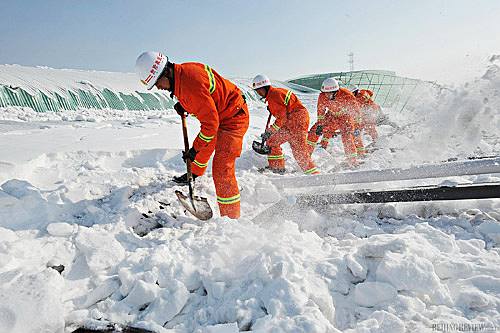|
 |
|
MINIMIZING LOSSES: Firefighters clear snow from buried flower greenhouses in northwest China's Ningxia Hui Autonomous Region on November 17, 2009 (LIU QUANLONG) |
The pattern usually confines cold Arctic air largely to the polar region. But the unusual pattern this year, an extreme negative phase of AO, allows cold air to flow south from the Arctic and results in winter weather in Northern Europe, North America and East Asia. "The negative phase of AO has occurred many times in history, but it is unusual for high pressure to occupy the Arctic for such a long time this year," said Ding.
According to Wang Yongguang, a senior research fellow with the National Climate Center, polar air masses meet vapor while flowing across the ocean during the process of moving southward, which results in blizzards in China's northeastern provinces and eastern parts of the United States.
Wang Shaowu, a Peking University's Department of Atmospheric Sciences professor, said that scientists around the world still disagree over how long the negative phase of the AO could last. "There hasn't been a universally acknowledged prediction scheme," said Wang.
Warming world
Most Chinese scientists say that cold conditions around the Northern Hemisphere do not justify claims that global warming has ended.
Ding said although China's first snow is one month earlier than average and many places have recorded their coldest December ever, the year 2009 was actually China's fourth warmest year on record since 1951 as far as national temperatures are concerned. "Blizzards and extremely low temperatures in some places are extreme weather events, which cannot reverse global warming, a rise of average temperature around the world," Ding said.
Ren said China's average land temperature climbed by 0.81 degrees Celsius between 1905 and 2006, which is almost at the average global warming speed. He said the public should not think that global warming means that every place will be consistently warmer than the year before everywhere on Earth and that cold weather in some areas over the course of a single winter mean global warming is not happening. He said temperatures would continue to rise as long as the density of greenhouse gases in the atmosphere keeps increasing.
"In the context of global warming, there will be an obvious increase in extreme weather events," said Ding.
Ding explained that rising temperatures could accelerate the Earth's water cycle, which could boost ocean evaporation and increase the risks of rainstorms. Meanwhile, the increase in ground evaporation could lead to more droughts.
As for some scientists' belief that the bitter winter in the Northern Hemisphere is only the start of a global trend toward cooler weather for the next 20 or 30 years, Ding said there is not enough evidence to sustain a mini-ice-age theory. He said many complicated factors contribute to climate change, such as human, solar and volcanic activity and internal changes within the climate system, meaning that ignoring any single factor could undermine the accuracy of the forecast.
He said four factors—low solar radiation output, reflective sulfate aerosols generated by frequent volcanic eruptions, the declining positive phase of AO and temperature drops in the central equatorial Pacific—have increasingly weakened the global warming trend since 1998, the warmest year on record. But he also said despite those factors, the last decade was still the fifth warmest on record since 1851.
Ding predicts that the climate will continue to turn warmer after 1998 while the chances for extreme cold weather grow, along with the damage caused by the chill.
Despite Chinese academia's consensus over the enduring global warming trend, severe winter weather is inspiring their studies on the relationship between greenhouse gas density rises and climate change.
"In the past, the academy might have overrated the sensitivity of the climate system to greenhouse gas density in the atmosphere. We need to study further to understand the factors behind climate change," said Ren.
Chen Xianyao, a research fellow with the State Oceanic Administration, is about to launch his study on the links between climate and ocean change. He told Guangming Daily that he disagrees with the Intergovernmental Panel on Climate Change hypothesis that global warming is due mainly to human activities. He believes that global temperature vibrates in a cycle of 65 to 70 years and peaked over the past decade. "I know I am the minority with this view," said Chen.
But the Chinese Government is determined to protect the voices of non-mainstream scholars like Chen.
"While some people believe global warming is caused by human activities, other people insist that it results from cyclical trends in nature itself. We should keep an open attitude toward these debates," said Xie Zhenhua, Vice Minister of the National Development and Reform Commission, during an international environmental conference in New Delhi. | 